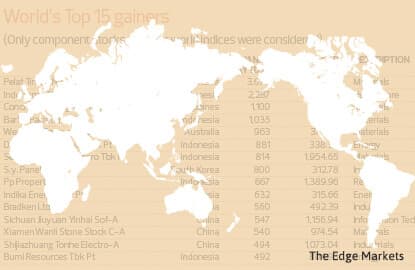
US energy stocks have been the outright performers this year. Seven of the top 10 gainers on the S&P 500 index are energy stocks, gaining between 68% and 143% this year.
To be fair, the energy stocks came off a low base after the crash in crude oil prices to as low as US$35 a barrel last year.
But going forward, oil prices look to be more stable. The Opec deal that was struck last week with non-Opec members to cut oil production and support crude oil prices at around US$60 a barrel was a sweetener for an already bullish sector. Once again, Donald Trump has had a hand to play in the positive outlook before even coming into office.
Energy stocks surged after Trump revealed his controversial choice of Oklahoma attorney-general Scott Pruitt to head the Environmental Protection Agency (EPA). Pruitt has a long history of challenging the EPA over regulations on water and power plants.
On top of that, Trump has also nominated Exxon Mobil Corp CEO Rex Tillerson as secretary of state.Exxon Mobil has gained 13.94% this year.
In the S&P 500, the top performing energy stock this year is Oneok Inc, rising 143.22% to close at US$57.01 on Dec 9.
That said, the top gainer in the index was tech stock NVIDIA Corp, which produces high-performance graphic cards. It had nothing to do with the Trump effect — NVIDIA has simply been able to deliver earnings that surpassed analyst expectations.
Other tech stocks have been relatively lacklustre. Apple Inc shed over US$20 billion in market capitalisation in October on weaker than expected third-quarter earnings . Despite the launch of the new iPhone 7 amid the recall of rival Samsung’s Galaxy Note 7, Apple has failed to gain investors’ confidence. The stock ended the year higher by a marginal 6.18% year to date.
For perspective, Samsung’s share price has gained over 40% this year to a record high despite the recall of the Note 7, which is expected to cost the South Korean firm US$3 billion. It is interesting to note that both Apple and Samsung are trading at relatively similar valuations of around 13 times earnings.
Other tech stocks that stand out include Japan’s Nintendo Co Ltd, which surged 68% this year to a record high as well. The hit Pokemon Go game certainly put Nintendo on investors’ radar, but the share price rally has already outlived the hype surrounding the augmented reality game.
Instead, eyes are now on the new hybrid gaming machine that the company teased in October in a bid to re-establish itself in the highly competitive gaming device industry.
The tech play, however, saw some major losers as well. Companies that specialised in one-hit-wonder devices like GoPro Inc and Fitbit Inc have struggled to sustain sales growth with new product line-ups. Compact action camera maker GoPro saw its share price fall by 51% while fitness wearable maker FitBit lost 73%.
Other notable underperformers this year include sports apparel giants Nike Inc and Under Armour Inc. Demand for athletic apparel has simply grown slower than expected this year.
Nike was the worst performing stock on the Dow Jones Industrial Index this year, down 18.23%. Meanwhile, Under Armour shed 30% of its value this year on weaker-than-expected earnings. Note, Under Armour’s sales still grew by 22% in the third quarter, but that was the slowest pace in six years.
But these lacklustre performances were nothing compared with the healthcare and pharmaceutical sectors, which caught a cold in 2016.
Some of the largest names in the industry shed 20% of their value this year, making them the biggest losers among the super big-cap stocks. Allergan Plc lost 39% of its market capitalisation this year, while Novo-Nordisk A/S shed 38.6%. Novartis, AG plunged 19.3% in the same period while Gilead Sciences Inc fell 27.39% and Astrazeneca PLC lost 20.65%.
For scale, these pharmaceutical companies have a combined market capitalisation of almost US$350 billion, despite the fall in value this year.
Going ahead, investors will be wondering if earnings will be able to catch up with the lofty valuations that US equities have racked up. All eyes will be on Trump as he takes office in January. His business-friendly, growth-oriented promises may have added fuel to an already hot US equity market, but his protectionist rhetoric has the rest of the world worried.
Equities in 2017 may well hinge on every tweet the new president makes.
Save by subscribing to us for your print and/or digital copy.
P/S: The Edge is also available on Apple's AppStore and Androids' Google Play.